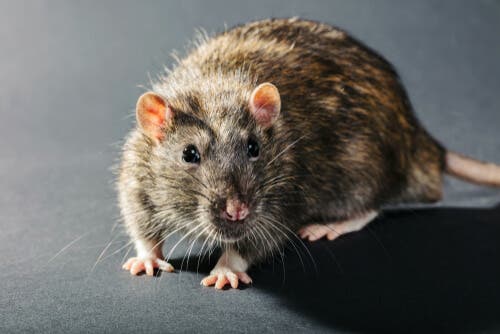Can Viruses Change Animals' Behavior?


Written and verified by the biologist María Muñoz Navarro
Viruses evolve because of their ability to adapt to different hosts and circumstances. In turn, this ensures their successful transmission. In this article, we’ll tell you all about how viruses change animals’ behavior in some cases.
Did you know that some viruses change animals’ behavior? It’s true! Throughout their evolution, viruses have acquired different mechanisms to adapt. This helps ensure their transmission from one host to another. One method viruses use is to change the behavior of living organisms.
Often, arthropods act as transmitting agents, such as ticks, fleas, and mosquitoes. Transmission occurs when one of these animals feed on blood (in the case of mosquitoes, for example) or other substances like sap (in the case of plants).
If the substance is infected by a pathogen like bacteria, parasites, or viruses, then the animal becomes infected. Then, the animal bites other animals or humans. This bite infects the animal or human, making them a new host.
In addition to affecting the transmitting agents, numerous viruses affect the host animal’s central nervous system. This infection of the nervous system can cause changes to the host’s behavior.
Now we’ll discuss some examples of strategies that viruses use to promote transmission.
Viruses that change the behavior of arthropod transmitting agents
1. Tomato spotted wilt virus. This virus belongs to the Bunyaviridae family. It affects crops and changes the eating behavior of its transmitting agent, thrips. Thrips are small insects that feed on plants.
Firstly, infected male thrips feed more frequently than uninfected males. Secondly, the virus stimulates salivation. This causes infected thrips to salivated up to three times more than uninfected thrips. These two changes to the animals’ behavior lead to an increased probability that the virus will transfer to the tomato.

Additionally, other viruses in this viral family, such as La Crosse (which causes La Crosse encephalitis) and Rift Valley fever virus, cause these transmitting agents to bite more frequently.
2. Dengue fever. The Aedes aegypti mosquito causes diseases such as yellow fever, dengue, and Zika fever in both animals and humans.
In this species of mosquito, females use their olfactory abilities to find the best place to lay eggs. The virus affects the central nervous system, altering its olfactory process. Then, this change expands the range of areas where the female will lay eggs. As a result, the virus is able to spread to other areas.
Therefore, you can see how viruses change animals’ behavior to evolve, adapt, and improve their transmission.
Viruses change animals’ behavior through the central nervous system
Changes to animals’ behavior can be changes in weight, temperature, taste preferences, food and water intake, and sleep patterns.
Viruses can play a direct role in these behavior changes. For example:
- In neonatal mice, Borna disease virus creates an abnormal taste preference for salt.
- Canine distemper virus induces weight loss in dogs. On the other hand, 5-10% of infected rats increase their weight by 300%.
- Influenza in mice and immunodeficiency virus in cats both cause changes in sleep patterns.
- Cognitive ability is associated with the neural system and involves learning, memory, motor, and motivation activities.
Viral infection can affect cognitive ability
Viral infections can affect cognitive ability directly or indirectly.
- Direct routes: These include neuronal cell lesions due to the virus’s own replication or because its components cause the cells to break down. Some examples are the rabies virus and herpes simplex virus.
- Indirect pathways: The virus damages different cells through disturbances to the microenvironment or as a result of the host’s immune response to infection. Experts suggest that multiple sclerosis, an autoimmune disease, starts with a persistent viral infection.
- Indirect pathways may be related to the development or worsening of neurodegenerative disorders, such as Alzheimer’s and Parkinson’s.
Viruses related to neurological disorders
- Influenza A. Mice infected with this virus show changes in behavior related to anxiety and cognition. These changes are due to alternations of gene expressions that regulate certain brain functions.

- Rabies virus. As you may already know, rabies causes drastic changes in the behavior of infected hosts. In fact, a study published in Scientific Reports found that the virus inhibits neurotransmitter receptors present in the central nervous system.
Viruses that affect other organs
- Seoul virus (also known as hantavirus). This virus transmits through rodents of various species. However, the virus doesn’t actually cause disease in these rodents. Instead, the virus can transmit to humans through the rodents’ saliva and feces. In humans, it causes hantavirus pulmonary syndrome. Moreover, one study from Norway shows that infected male rodents exhibited much more aggressive behavior than uninfected males.
The reason for this behavioral change could be the presence of the virus in the rodents’ lungs, kidneys, and testicles. Moreover, the increased aggressiveness leads them to bite more. As a result, the virus spreads more easily through the wounds.
Viruses change animals’ behavior
As we’ve seen, viral infections that affect the central nervous system can cause neurological abnormalities, as well as changes to behavior. Therefore, we can clearly say that viruses can change behavior.
Once scientists have a better understanding of the effects or chronic or persistent central nervous system viral infects, we’ll be able to understand better how these behavioral changes occur on a molecular level.
All cited sources were thoroughly reviewed by our team to ensure their quality, reliability, currency, and validity. The bibliography of this article was considered reliable and of academic or scientific accuracy.
- Glass, G.E., Klein, S.L. and Zink, M.C. (2004) Seoul virus infection increases aggressive behaviour in male Norway rats. Animal Behaviour, 67 (3), pp 421-429.
- Gaburro, J., Klein, M. et al. (2018) Dengue virus infection changes Aedes aegypti oviposition olfactory preferences. Sci Rep, 8: 13179.
- Aronsson, F., Beraki, S., Karlsson, H. et al. (2005) Influenza A virus infection causes alterations in expression of synaptic regulatory genes combined with changes in cognitive and emotional behaviors in mice. Mol Psychiatry 10,: 299-308.
- Tomonaga, K. (2004) Virus-induced neurobehavioral disorders: mechanisms and implications. TRENDS in Molecular Medicine: 10,2. 1471-4914.
- Hueffer, K., Khatri, S., Rideout, S. et al. (2017) Rabies virus modifies host behaviour through a snake-toxin like region of its glycoprotein that inhibits neurotransmitter receptors in the CNS. Sci Rep: 7; 1: 12818
- Candice. A., Diane, E. and Gregory, P. (2011) Infection with a plant virus modifies vector feeding behavior. PNAS, 108; 23: 9350-9355.
This text is provided for informational purposes only and does not replace consultation with a professional. If in doubt, consult your specialist.